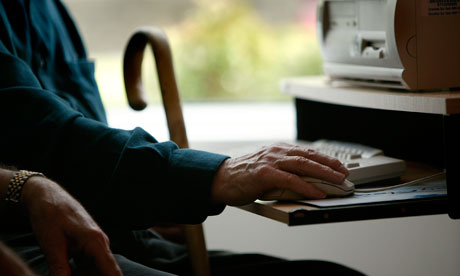Family Carers need the internet for support and friendship
Why it’s important to get older people and carers confident online
Rates of digital exclusion in social care are higher than in the general populationinShare0
-
Emma Solomon
- Guardian Professional,

The government’s digital by default agenda seeks to realise £1.8bn of savings by moving transactions with citizens online and it aims to boost the value of the economy by £63bn by developing better digital skills across the country.
Evidence suggests that being net savvy can save us time, money, make us feel better connected, less lonely and better informed. Conversely, being digitally excluded means having less (and diminishing) access to public and commercial services, to information and advice and to social interaction, all of which adversely impacts on wellbeing.
When depression affects 20% of older people living in the community and 40% living in elder care homes, compared with 10% of the population at large, and when national data shows that informal carers have lower levels of wellbeing than non-carers, being digitally literate is not just desirable, it becomes necessary.
Digital Unite research has shown that of those over 55s who are using the internet, four out of five (86%) said it had improved their lives, 72% said being online had helped reduce their feelings of isolation and 81% said using the internet makes them feel part of modern society. In addition, 20% of older learners in a Digital Unite social housing learning programme felt their understanding of health-related issues had improved as a result of being online.
There are 7.4 million people in the UK who have never used the internet, of which 70%, (6.3 million), are aged over 55. Rates of digital exclusion in social care are higher than in the general population and there are 1.6 million people providing adult social care services in England, and 6 million unpaid carers. It is clear that we still have work to do to support older people and those involved formally or informally in social care to be digitally capable and confident.
For many, the biggest barriers to digital usage are lack of knowledge and confidence. When social care employers and unpaid carers were asked in a Mori study for Scie what the biggest barrier to accessing the online world was, they said lack of skills and confidence. Indeed 63% of working age non users and 78% of retired non users said they do not know how to use the internet.
Fortunately bringing people online requires only the most basic digital literacy; the challenge is making that happen in a supportive way. That is where national digital inclusion drives, such as our Spring Online campaign (22-26 April), have a pivotal part to play.
Now in its 12th year, it galvanises and supports organisations across the UK to open their doors and run free digital taster events for local people with an army of friendly event holders standing by to give a helping hand.
From Monday 22 April onwards, hundreds of Spring Online events will be taking place in England, Northern Ireland, Scotland and Wales in libraries, shops, schools, sheltered housing schemes, cafes, community groups, village halls and churches. There are even events in a cinema, a pub, a London market and a candle shop and bespoke events for carers and those with visual and hearing impairments.
Last year through these activities, thousands of older people were helped to understand and use digital technology, many for the first time, including carers. “The computer has totally opened up my life” commented one.
Helping people to be digitally engaged and confident can have life-enhancing benefits for themselves and those around them – Spring Online offers a helping hand close to home to get them started.
Emma Solomon is managing director of Digital Unite
http://www.guardian.co.uk/social-care-network/2013/apr/22/helping-older-people-carers-online






